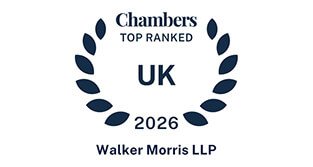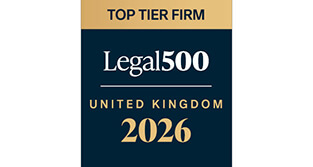ESG and your supply chain: Update Spring 2025
9th June 2025
“The ESG regulatory and legislative landscape is changing rapidly. But responsibility and corporate reporting play a vital role in enabling businesses to safeguard human rights and sustainability – from both a compliance and a commercial perspective. In this article, we highlight the latest developments, to help keep your business on top of ESG supply chain law and good practice.”


ESG responsibility and reporting throughout supply chains
In all sectors, UK businesses are addressing ESG (Environmental, Social, Governance) goals through their internal policies, practices and operations.
But recent developments highlight the need for businesses to extend this focus to ESG issues in their supply chain. For example:
- The World Uyghur Congress v National Crime Agency Court of Appeal decision suggests companies could face the possibility of an investigation by regulators if there’s any suggestion of criminal property, money laundering or labour/human rights abuses within the supply chain.
- There are signs of an increase in ‘stock drop’ litigation within the UK. Stock drop cases are often prompted by share price decline linked to false or misleading corporate disclosures on ethical and sustainable practices.
- A report by the House of Lords Select Committee on the Modern Slavery Act 2015 recommended amendments to the existing regime underpinning slavery and human trafficking statements, and the introduction of mandatory modern slavery due diligence in supply chains. The Home Office has since updated its statutory guidanceon transparency in supply chains under section 54 of the Act [1].
- Also in relation to modern slavery, the Joint Committee on Human Rights is conducting an inquiryinto forced labour in UK supply chains. It’s considering legislation in relation to preventing goods linked to forced labour from entering the UK market. It intends to learn from international approaches to enhance the UK’s legal and regulatory framework.
- The Court of Appeal and Supreme Court recently decided that a case brought by migrant workers against Dyson, including allegations of forced labour and dangerous conditions at two Malaysian factories, can be heard in the English courts.
- We reported, back in 2021, on Milieudefensie et al v Shell Plc, in which Shell was found to have breached the Paris Agreement treaty on climate change. A recent appeal decision in that litigation now clarifies that businesses have a duty which likely goes beyond complying with existing laws and regulations. Rather, compliance should be seen as the starting point, rather than the goal, of corporate climate responsibility. The decision therefore seems to expand, rather than reduce, corporate climate responsibility, albeit to an unspecified extent.
- Last year’s Supreme Court judgment in Finch v Surrey County Council required Scope 3 emissions [2] to be taken into account in a planning decision. The case signals that businesses need to take indirect emissions in wider circumstances than legislation or case law had previously required.
- Also on Scope 3 emissions, the Voluntary Carbon Markets Integrity Initiative recently launched its Scope 3 Action Code of Practice. It aims to help businesses grappling with how to deal with emissions across their value chain and the issue of integrity in the voluntary carbon market.
- Shortly following the Finch decision, the Partnership for Carbon Accounting Financials [3]called for industry input on proposals for measuring and reporting “avoided and expected GHG emissions” – a form of ‘Scope 4’ emissions [4].
- A key tenet of the UK government’s net zero strategy is the drive towards a circular economy. The Circular Economy Taskforcehas published its Terms of Reference and confirmed that a circular economy strategy, underpinned by a series of roadmaps for reform in different sectors and their supply chains, will be forthcoming by autumn 2025. The government has confirmed that the Taskforce will focus, as a priority, on the following 5 sectors: textiles, transport, construction, agri-food and chemicals & plastics. Following the Taskforce’s April Engagement Forum, the government is to review various strategies, including the Farming Roadmap, the Critical Minerals Strategy, the Carbon Budget Delivery Plan and the Trade Strategy, to ensure they align with the upcoming Circular Economy Strategy.
Key legislative developments: EU CSRD, CSDDD and the ‘Omnibus’ package
Within this ESG-focused context, there are some really key pieces of legislation of which businesses operating within the UK and Europe should be aware: the EU Corporate Sustainability Reporting Directive (CSRD) and the Corporate Sustainability Due Diligence Directive (CSDDD).
The EU CSRD aims to provide investors and other stakeholders with access to more decision-useful information about companies’ sustainability risks, opportunities, and impacts. It mandates reporting on a range of ESG topics in accordance with the European Sustainability Reporting Standards. The CSRD requires in-scope corporate entities to describe their supply chain, to undertake ‘materiality assessments’ of the ESG impacts of the business and its supply chain, and to report accordingly.
The CSDDD will introduce mandatory human rights and environmental due diligence requirements for large EU companies, and non-EU companies operating in the EU. In-scope companies will need to identify and address adverse human rights and environmental impacts in their own operations and throughout supply chains. The new rules will become applicable to companies according to a staggered timeline (largest to smallest companies, then franchisors/licensors). For more information on the CSDDD, please see our earlier article.
As both of these are sweeping pieces of legislation, which will significantly impact supply chain operations and reporting, concerns have been raised as to the level of complexity and administrative burden imposed on in-scope businesses.
Consequently, on 26 February 2025, the EU published its Omnibus Simplification Package – a proposal to simplify sustainability due diligence and reporting, including via the CSDDD and the CSRD. The intention is to mitigate administrative burdens, boost competitiveness, and unlock investment capacity.
The Omnibus Package seeks to defer the coming into force of CSDDD. It envisages the deadline for Member States to transpose CSDDD into national law being postponed to 26 July 2027, and the compliance deadline for the first wave of in-scope companies being postponed to 26 July 2028.
The Omnibus Package would also bring forward, to July 2026, the date for publication of compliance guidance by the EU Commission, to give businesses more time to prepare.
The proposal may also water down CSDDD due diligence measures. Re CSRD, the proposal intends to reduce the number of companies within scope and postpone reporting requirements by 2 years for companies that were due to comply for financial years 2025 and 2026.
Walker Morris will monitor the Omnibus Package, the CSRD and the CSDDD and will report on developments.
Addressing ESG in your supply chain: A step-by-step approach
We spoke recently to Legal 500’s In House Lawyer Magazine about the practical steps businesses can take to address ESG in their supply chains. For our recommended step-by-step approach, read the IHL article here.
One particularly important step will be for companies to adopt and put into place a climate transition plan. In October 2023, the Transition Plan Taskforce (TPT) published its Disclosure Framework, which sets out good practice recommendations for making robust and credible disclosures about climate-related transition plans. The Disclosure Framework is a key component of the TPT’s wider materials designed to aid organisations’ transition planning. For further advice and information, see Walker Morris’ briefing.
Working together
Finally, formulating, implementing, maintaining and developing an effective ESG strategy in-house and across the supply chain isn’t something that you have to tackle alone. Walker Morris’ sustainability and supply chain specialists can help with:
- Internal and upstream/downstream supply chain audits, contract reviews and contract negotiations/re-negotiations and/or terminations
- Drafting and implementing sustainability and due diligence policies and procedures
- Keeping you updated and informed on sustainability-related legal and regulatory developments
- Providing tailored training to staff at all levels
- Assisting you in securing ‘green finance’ or investments based on sustainability criteria
- Delivering low carbon, sustainable and other ‘green’ projects
- Assisting with measuring and reporting of energy, carbon, climate and human rights risks
- Designing and implementing effective transition planning strategies and reporting
- Providing comprehensive, cross-disciplinary advice and transactional assistance
- Risk management and dispute resolution strategies if/when sustainability or due diligence queries, concerns or investigations arise.
Please contact James Crayton or Andrew Northage for further information or advice.
[1] Under section 54, businesses with an annual turnover of £36 million or more that supply goods or services and conduct business in the UK must publish an annual slavery and human trafficking statement.
[2] ‘Scope 3′ emissions are indirect emissions within a business’ value chain which are a consequence of the business’ activities, but which occur from sources not owned or controlled by it.
[3] a body launched globally in 2019 to harmonise GHG accounting methods and enable financial institutions to consistently measure and disclose the GHG emissions financed by their loans and investments
[4] Scope 4 emissions are even more indirect. They are: the avoided emissions that are prevented or reduced as a result of a company’s products or services; home working emissions; or emission reductions that happen outside of a life cycle of the product or value chain, but as a result of the use of that product.







